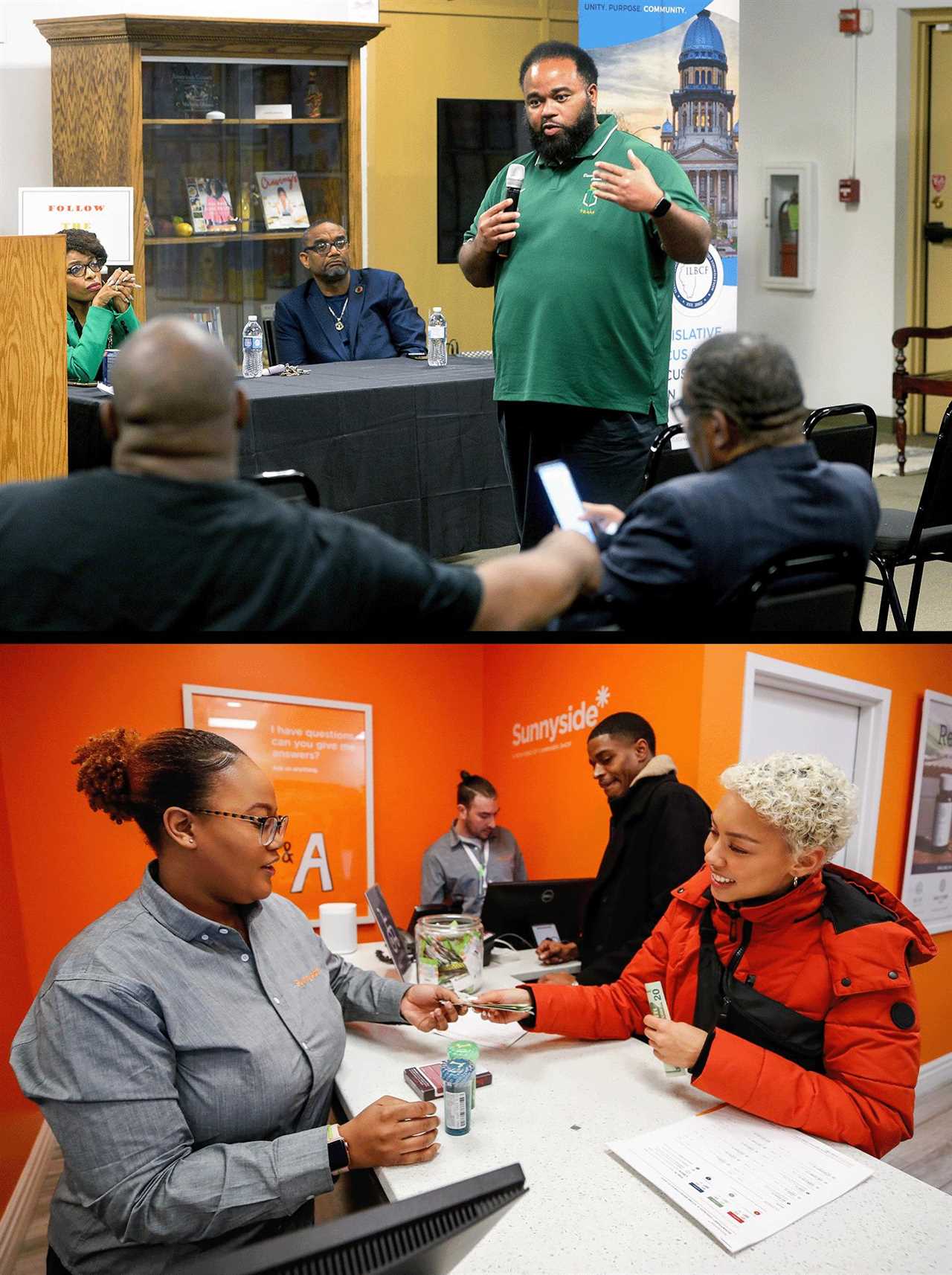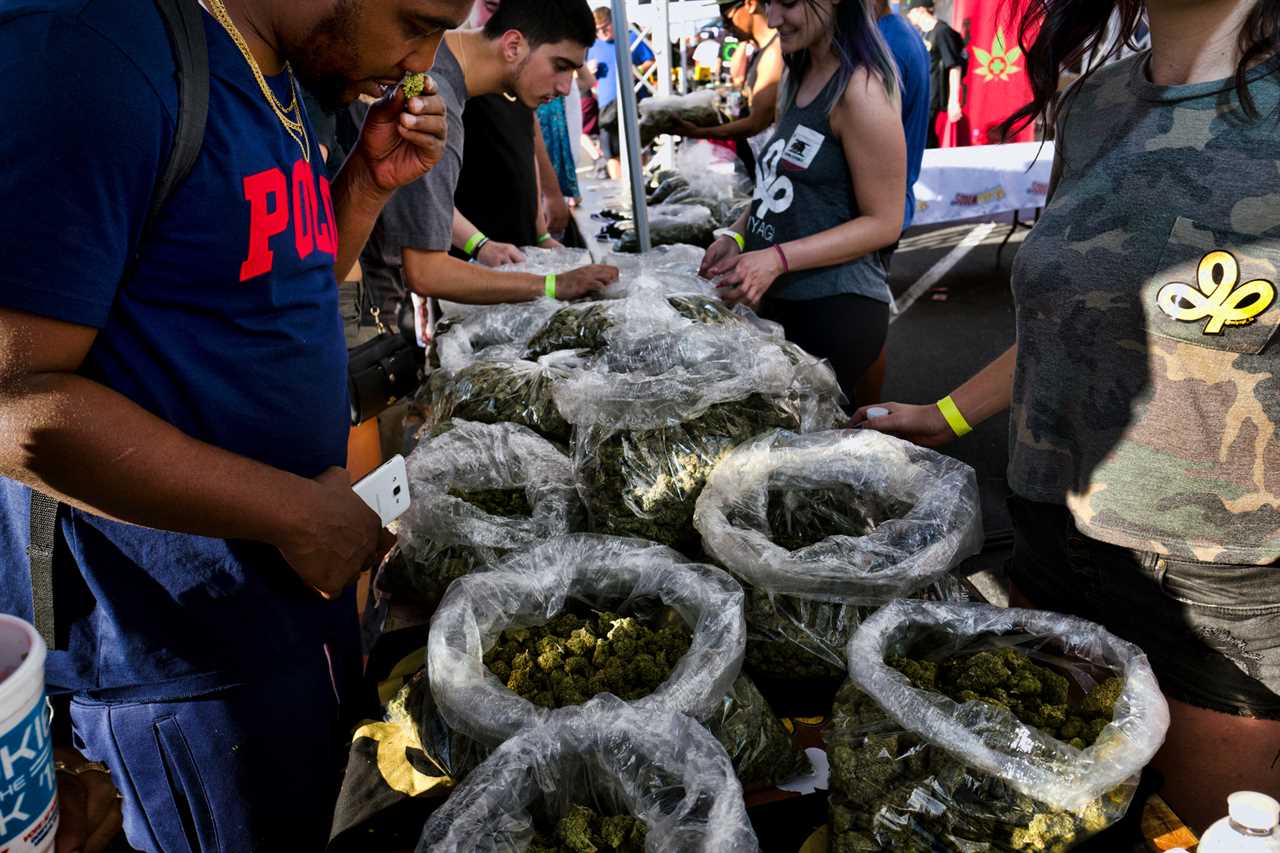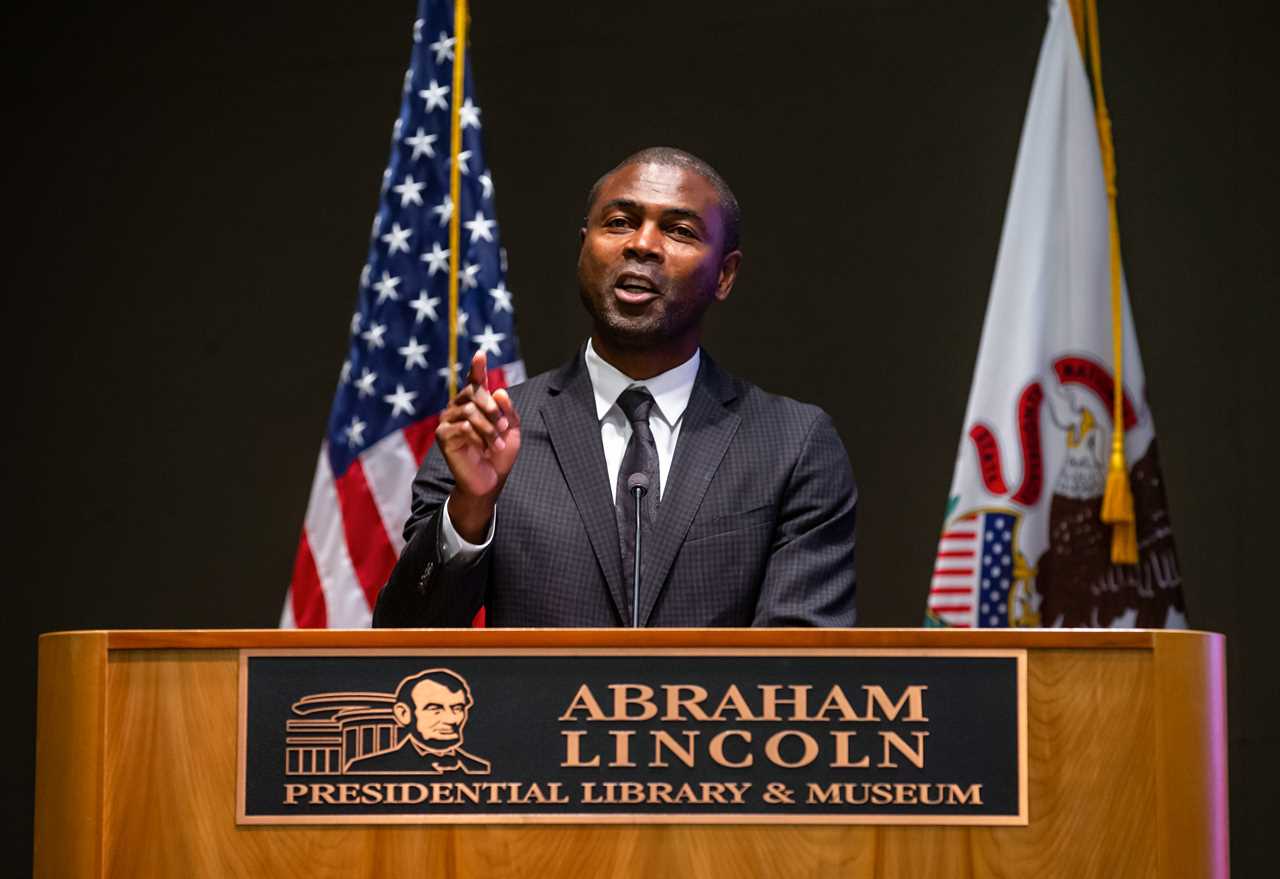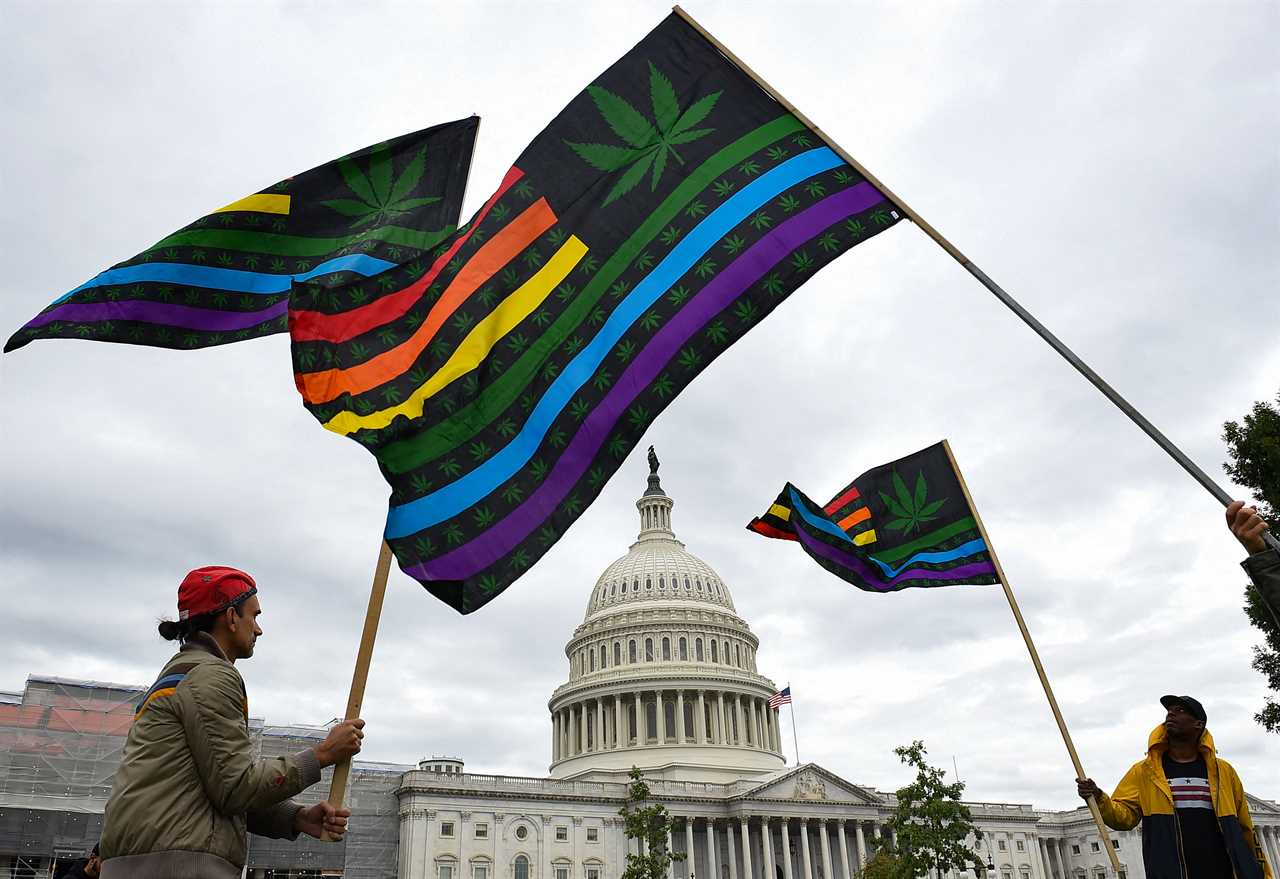
In the long and contentious fight for marijuana legalization, lawmakers across the country won over skeptical colleagues by promising social justice: The economic benefits of cannabis sales would be targeted at communities marred by decades of racist drug enforcement policies.
New York’s plan would be “transformative” for afflicted communities, said Majority Leader Crystal D. Peoples-Stokes of the state assembly.
Los Angeles, California, would “level the playing field” for the downtrodden, vowed Councilmember Curren Price.
Illinois would “right the wrongs of the past,” proclaimed state Rep. Jehan Gordon-Booth.
The result, almost a decade since the start of the legalization movement, has been a series of increasingly elaborate programs designed to ensure that the spoils of legal marijuana sales — which are projected to hit $35 billion this year, and double again by 2030 — would benefit the communities hardest hit by the war on drugs.
But a POLITICO investigation found that those efforts have failed to deliver the promised economic justice, while overwhelmingly white and wealthy investors seek to benefit from the cannabis boom.
The reasons for those failures vary from state to state, but some of the key factors behind the blunders of state equity programs were lack of funding, shoddy implementation, legal fights and struggles to access banking services. Many frustrated minority entrepreneurs say they’ve emptied their bank accounts to take advantage of what were touted as extraordinary economic opportunities only to find their plans derailed by the botched enactment of poorly designed policies.

No comprehensive nationwide numbers are available about the racial, ethnic and gender makeup of business owners operating in state-legal cannabis markets. That’s in large part because every state market operates in isolation and data collection is scattershot and inconsistent. Cannabis remains illegal at the federal level.
A POLITICO analysis of statistics from various markets offer a grim assessment of how these efforts have fared.
In Illinois, for example, there were no Black or Hispanic majority owners of dispensaries in 2022, three years after cannabis was legalized, though that number has since climbed to 37 out of 200 retail outlets in 2023, according to the state’s Department of Financial and Professional Regulation. In Michigan, nearly 90 percent of business license holders who responded to a state survey identified themselves as white, while those who indicated that they were Black, Latino or Asian each accounted for no more than 5 percent of the total. And in Washington state, at least 82 percent of license holders were white, while all other racial and ethnic groups accounted for 16 percent combined, according to a 2022 report.
Some states have made strides in diversifying the industry. The most striking example might be Nevada, where nearly 40 percent of industry executives are Black or Latino, according to a report issued in January.
Other states have made more piecemeal progress. In Colorado, for example, 18.8 percent of licensed cannabis businesses are minority owned, in a state where 86 percent of the population is white, according to the most recent data.
Even for those who’ve successfully overcome the regulatory hurdles, the anticipated financial windfall from legal weed sales has proven illusory. The vast majority of companies are hemorrhaging red ink, even as their owners bank on future growth. The 10 largest publicly traded U.S. weed companies lost more than $2 billion in 2022, according to a POLITICO analysis of financial filings.
“All the regulatory problems, lawsuits and self-inflicted wounds have led to an environment where it’s very difficult to get money from investors because everyone is realizing this is not the money-growing-on-trees industry that people thought it would be,” explained Mark Peysakhovich, an Illinois lobbyist whose clients include hemp and cannabis companies.
Efforts to redress the repercussions of the war on drugs have moved forward in some places — but not because of marijuana legalization. State programs to scrap old marijuana-related convictions have spared millions of people the stigma of criminal records, which can hamper them in seeking housing, employment or other basic needs. In Illinois alone, more than 500,000 convictions have been wiped away.
But the major selling point of legalization — that it’s a way to make amends for decades of enforcement policies that disproportionately targeted Black and brown communities — has failed to materialize.

“You can’t get racial justice until you get economic justice,” said Toi Hutchinson, who served as Illinois’ first cannabis czar and is the former executive director of legalization advocacy group Marijuana Policy Project, in an interview. “There's nowhere you [can] go and say that’s where it works. That’s not happening. This is still very, very nascent.”
State equity programs have proven to be "an almost complete failure," said UC Davis economist Daniel Sumner, co-author of the book Can Legal Weed Win?
In Sumner’s view, cannabis regulators should be delivering a blunt message to prospective social equity entrepreneurs: "Take all the money you can scrape together, we'll help you [and] you're almost surely to lose everything."
Six years ago, Los Angeles became a pioneer in creating a social equity program for weed entrepreneurs.
“I’m ready to level the playing field so that everyone has a fair shot at reaping the rewards of this booming industry,” Price said during a 2017 City Council meeting where regulations were enacted for the fledgling recreational weed market. “Because we shouldn’t just be rolling out the red carpet to those individuals with deep pockets or powerful corporations.”
But the city’s initial effort was “a disaster,” said Virgil Grant, who operates three dispensaries in the city after serving six years in federal prison for marijuana.
The biggest obstacle encountered by entrepreneurs from communities marked by high poverty rates and inordinate levels of drug arrests: There was initially no money allocated by the city to help them navigate the time consuming and expensive process to get their businesses open.
In the early days of L.A.’s social equity program, rules required people to secure a lease even before they could apply for a license. Finding real estate in one of the country’s most expensive cities was already an overwhelming challenge for entrepreneurs who, by definition, lacked resources. But the slow pace of the rollout meant many who managed to secure leases were paying rent for years even though they were unable to open for business.
“You basically bled them out financially [and] they all fell out of the industry,” Grant said.

Because weed remains federally illegal, cannabis businesses are largely shut out from the banking system and that makes it exceedingly difficult to raise funds to secure property and bankroll their operations.
That fundamental challenge is compounded by competition from an entrenched illicit market. Industry officials estimate that unlicensed shops now account for more than 80 percent of cannabis sales in Los Angeles, roughly five years after California launched its recreational market. Cash-strapped businesses struggle to compete with underground retailers that don’t have to pay licensing fees or adhere to costly regulations. Nationwide, the situation is nearly as bleak: 75 percent of cannabis sales are still in the illicit market, according to Whitney Economics, which tracks the industry.
The funding problems faced by entrepreneurs were also exacerbated by an application process so confusing and lacking in accountability that it left lots of would-be entrepreneurs wondering if the system was rigged. Many winning applicants, Grant and others contend, ended up using residents of areas with disproportionate cannabis-related arrests like Compton and South Central on their applications, and actually lacked ties to those communities themselves.
Ultimately, a third-party audit of the licensing round detailed problems with the first-come, first-served application process. While the report found that regulators acted "in good faith," it recommended various changes including altering the criteria for program eligibility and using a lottery to select winners. The audit also hinted at concerns about who actually owns companies that secured equity licenses. It recommended bolstering regulations "to ensure that those most impacted have unconditional and direct control of their business."
The end result of all these problems: 200 social equity entrepreneurs are open for business out of a total of 457 social equity licensees, according to the latest data from the Los Angeles Department of Cannabis Regulation.

Even those that managed to get licensed and open up shop are struggling.
Rhavin Klein, an entrepreneur who secured a license in the first round, opened her shop on Dec. 31, 2021 as part of a group of applicants under an umbrella group known as 4thMVMT. That coalition helped 13 applicants raise capital and provided technical assistance to navigate the licensing process, and came under criticism for dominating the application process.
Even with that support, only two entrepreneurs of the 13 ended up actually opening dispensaries. And an initial investor in 4thMVMT pulled out, leading the organization to pull the assistance it had been offering to applicants.
“For something that was sold to us as an amazing opportunity … it has not been easy,” Klein said, noting that 4thMVMT’s abrupt exit has been devastating for her nascent business. “Everything bled into every area of my life. It’s impacted our personal lives too. I’m literally going through a divorce.”
The problems with L.A.’s social equity program so frustrated would-be weed entrepreneurs that city officials sometimes worried about violence.
“For a while, I was really concerned about our safety,” said Imani Brown, director of L.A.’s social equity program, recalling meetings where hundreds of furious people showed up. “Several times we had to have police escort us to our cars.”
When Illinois enacted legislation in 2019 establishing an adult-use market, it was hailed as a landmark effort to mitigate the harms of the war on drugs.
"This historic legislation will right the wrongs of the past and truly serve as a model for other state legislatures as they look for an equity-centric approach to legalize and regulate recreational cannabis," said Gordon-Booth, the Illinois state lawmaker and a key legalization supporter, in a statement after the bill passed. "This is nothing short of a landmark moment for criminal justice reform in the state of Illinois.”
But a deluge of lawsuits challenging the licensing process led to three years of delays in implementing the program. Court battles ensued after a state-hired contractor made mistakes on scoring applications and over a dispute about giving preferences to veterans. The protracted delays allowed the state’s existing medical market operators — dominated by white-owned businesses — to gain an entrenched advantage in serving the fledgling recreational market.
Perhaps more significantly, it created even more financial headwinds for social equity entrepreneurs looking to get a toehold in the state’s $1.5 billion industry.
“For many applicants, the time that the court held up licensing was an absolute killer,” said Ron Holmes, a Chicago-based cannabis lobbyist who has worked with many social equity applicants. “Most folks who applied using the social equity criteria didn’t have the proper resources to fight the wars on two different battlefields.”
While some social equity players went into the process with outside investors, others applied with only their own financial resources. When they actually got licenses, and realized that more cash was needed, they discovered that investors were hard to come by in the quasi-legal industry.
Illinois’ current law requires applicants to secure funding, find a location that meets zoning rules and build it out. Then they have to purchase cameras and other security equipment required for their locations. All that must be done before the state will allow them to open their doors.
Even the most well-connected licensees have struggled to get their operations running.

“I've made it through zoning. I've found the location. But money dries up,” said Rickey Hendon, a former Illinois state senator who has a stake in a cannabis company, in an interview. “And this is a tough financial market. It's terrible. So, you add that with the red tape, and there are no Black or brown dispensaries.”
The process has proven so frustrating that some social equity applicants are looking to turn around and sell their licenses, often to large cannabis companies with white owners. Earlier this year, for example, Planet 13 Holdings — which is best known for operating a massive weed emporium just off the Las Vegas Strip — announced that it was purchasing the remaining 51 percent of a social equity licensee Frank Cowan’s dispensary in Waukegan, Illinois, near the Wisconsin border.
It’s a lucrative payday for owning a business that had never opened its doors: Nearly $900,000 and just over 1 million shares of the publicly traded company.
Transactions like that one have unleashed a fierce debate about the goals of cannabis social equity programs. Some argue that selling licenses to white-owned companies defeats the purpose of creating licensing rules explicitly designed to help people disproportionately targeted by criminal enforcement.
“I personally hate it. I absolutely hate it,” Holmes said. “There are enough qualified minority businesses that these folks are standing in the way of.”
But others point out that social equity entrepreneurs are well within their rights to turn around and sell their licenses to the highest bidder and reap a big financial windfall. Hutchinson argues that it would be unfair to prohibit social equity applicants from selling their licenses in an effort to diversify the industry, particularly given the financial struggles that have hit so many of them.
“There’s no money in cannabis anymore,” Hutchinson said. “No matter how bad it is, we’re gonna make you stay in that position and continue to lose money … because we want to make sure there’s somebody Black in that position? Is that what we’re saying?”
Even social equity programs that have seemingly achieved some level of success have left weed entrepreneurs questioning the benefits.
When Massachusetts legalized cannabis in 2016, the state became one of the first to form an equity program. Sieh and Leah Samura saw this as an opportunity to realize their cannabis dreams.
The Samuras seemingly had everything going for them: Equity priority status, investors who believed in their plan — and they were trying to open up a shop in upscale Cambridge.
The liberal bastion and college town intended to set the standard for how local governments could support equity applicants in Massachusetts. At the behest of local advocacy groups, Cambridge put a moratorium on all non-equity applicants receiving licenses or opening their doors in the city for the first two years.
But that program created unexpected problems. Revolutionary Clinics, an existing medical shop in Cambridge, sued the city over the moratorium keeping them out of the recreational market — and a state judge ruled that the local ordinance violated state law and blocked implementation.
Because of the state’s real estate requirements for cannabis license applicants, the Samuras had to keep paying expensive leases while waiting for the lawsuit to be resolved.
“We're all forced to start deep, deep, deep in the red,” Sieh said. “A tremendous opportunity was missed in Massachusetts by giving so much local control and allowing these licenses to become in reality so expensive.”

The lawsuit was eventually dropped, and Yamba Market finally opened last April. The shop is in a prime location: Just by a T station and walkable from the Massachusetts Institute of Technology. When Leah's shop opens on Harvard Square — she received her final license in early December and plans to open her doors soon — the Samuras will have a second shop in another prime location.
But the Samuras are financially deeply in debt from a five year long licensing process, and they won’t be operating in the black for a long time. Ultimately, Sieh says the equity program couldn’t make up for the financial barriers put up by the state’s regulatory model — and wishes the state had chosen a different framework.
“[Equity programs] all seem engineered to fail,” Sieh said. “They all seem like they're not really informed by the actual people who are doing the work.”
Many cities and states are now attempting to retool their programs and rectify the failures.
Los Angeles’ social equity program started in 2017, but didn’t get funding until 2019, explained Brown, the program’s director. Then, just as regulators were working to put that funding to use, the coronavirus pandemic hit and gummed up the works even more.
Brown’s biggest piece of advice to regulators elsewhere tasked with implementing social equity programs is to make sure you have all your funding in place to boost business owners before issuing licenses.
“People’s hopes were so high but then the reality set in,” Brown said. “Folks had invested their life savings to hold onto property. ... That was a major mistake that the city made.”
Los Angeles has now given out $12 million in grants for things like dispensary buildouts, licensing fees and rental assistance. But even so, many business operators say they are just barely scraping by.
Rhavin Klein has received $40,000 in grants from the city already, and is waiting on a final disbursement of $10,000.
“It’s helpful, but it’s not enough,” she said, considering how costly it is to rent commercial space in L.A. “It’s important to have the funding to really be able to stand us up.”
In Illinois, state legislators have formed a working group to figure out how to solve the problems that are preventing Blacks, Latinos, women and veterans from opening cannabis dispensaries.
“The state needs to loosen these rules that are killing the governor's vision of allowing minorities into the industry,” said Hendon, the former state lawmaker who’s trying to open a weed shop. “We're saying to the governor, ‘You need to fix this.’”

Democratic state Rep. Marcus Evans points out that there are over 13 state agencies that have a say in cannabis. Lawmakers had proposed creating a state cannabis agency to consolidate all those tasks under one roof, but all those involved have been at odds about how to do that.
“It creates confusion” in the industry, Evans said. “You know how it is, when you’re not rich, time is money, right?”
The other big priority is to put money into minority businesses, said Democratic state Rep. La Shawn Ford, who chairs the working group trying to help minority cannabis dispensary applicants succeed.
He is working on legislation that would release state grant money to help license holders scale up and bring in investors — something that’s currently not allowed.
“The fact that this is an industry that is driven by cash and that banks aren’t allowed to lend, it shuts people out,” Ford said. “By keeping it a cash industry, it puts Black people, brown people, minorities behind with no way to catch up.”
Lawmakers are expected to consider the legislation in January when the General Assembly’s veto session convenes.
But time may be running short for state and city officials to retool these efforts and get results. The future of these programs are potentially imperiled by both the courts and the federal government.
The courts are wrestling with the legal uncertainty caused by the disconnect between state and federal laws when it comes to cannabis. Federal courts have struck down cannabis laws that favor in-state residents in Maine, Missouri and Michigan. Those rulings threaten social equity programs that often contain some sort of residency-based requirement.
If courts coalesce around that view, it could make it even trickier for state and local governments to craft licensing programs to help people harmed by criminal enforcement.
The threat from the federal government is a reflection of the incredible success of the legalization movement over the last decade. More than half of Americans now live in states where adults can legally possess marijuana.


Congress has been far behind the country when it comes to loosening cannabis restrictions. Lawmakers have failed to pass any significant changes to federal policies, despite broad bipartisan support for proposals such as making it easier for weed companies to access banking.
But most cannabis policy watchers believe that something akin to federal legalization is inevitable in the coming years, given the dramatic shifts in state laws and public opinion, with 70 percent supporting legalization in the most recent Gallup survey. That prospect could throw open state markets that have operated in silos due to federal illegality to interstate commerce.
That would make it easier for big national companies — who may vie to become the Anheuser-Busch of weed — to take advantage of economies of scale and become more dominant players.
The latest cautionary tale is New York. The state is in the midst of implementing the country’s most ambitious effort to use cannabis legalization as a tool to redress the harms from the war on drugs.
New York reserved all initial dispensary licenses for people who have been convicted of marijuana crimes or have an immediate family member with such a conviction. It’s also promising to provide funding, real estate and training to help these entrepreneurs launch successful businesses.
But a lawsuit filed in August by service-disabled veterans — arguing that they’re being unfairly shut out of the program — ground the licensing process to a halt. After four months of waiting in limbo, the veterans and the state struck a settlement agreement that lifted the injunction in December.
Still, only 35 licensed shops have opened for business more than two years after legalization was enacted.
Meanwhile, thousands of illegal dispensaries — an estimated 2,000 in New York City alone — have proliferated across the state.
That's left entrepreneurs like Carson Grant frustrated with the program’s deficiencies. Grant, who was a young Black man in New York during the era of aggressive policing under then-mayor Rudy Giuliani, was arrested numerous times for marijuana possession. This made it difficult to find work.

He says the employment barriers led him to turn to selling weed to support his two young daughters as a single father, which eventually landed him with two felonies, making it even more difficult to get a job.
In other words, he is exactly the type of entrepreneur that New York's program is trying to help.
During a contentious meeting in June in New York City, Grant spoke out about being kept in the dark on the terms of a loan from the state for his business, the costs of building out his dispensary and how regulators continually ignored his efforts to find out the information he needed to launch his business.
"The way I look at this — this is financial slavery," he said during an impassioned speech before state officials. "I've been traumatized and victimized again, just more lies and brushing things under the rug."
----------------------------------------
By: Mona Zhang, Shia Kapos and Natalie Fertig
Title: Broken promises: How marijuana legalization failed communities hit hardest by the drug war
Sourced From: www.politico.com/news/2023/12/23/marijuana-legalization-inner-cities-00121185
Published Date: Sat, 23 Dec 2023 07:00:00 EST
Did you miss our previous article...
https://consumernewsnetwork.com/politics-us/your-guide-to-the-chaotic-2024-polling-year-ahead






